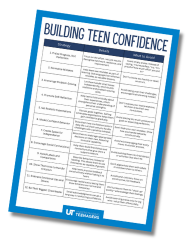Teenagers and confidence—two words that sometimes feel like they’re from entirely different planets. One moment, your teen is delivering a profound insight that makes you wonder if you’re raising the next great philosopher. The next, they’re tripping over their own feet while trying to leave the room. Confidence in teens is a delicate balancing act—just as they’re starting to soar in one area, a bad hair day or a tiny misstep can bring them crashing back down to earth.
But don’t worry! Building confidence in teens isn’t as hopeless as waiting for your plants to apologize for not thriving. In fact, with the right mindset and strategies, parents can help their teenagers develop a confidence that’s grounded and resilient and stays with them long after their teenage years.
Table of Contents
ToggleUnderstanding Confidence in Teenagers
Confidence is one of those elusive qualities that develop over time, often through a mix of small victories, awkward stumbles, and the occasional “What was I thinking?” moment. Think of it like a muscle—it gets stronger with regular use, thrives on a steady diet of encouragement and constructive feedback, and occasionally needs some rest after being overworked.
For teenagers, building confidence can feel like trying to assemble IKEA furniture without instructions. Adolescence is a time of rapid changes—not just physically, but mentally and emotionally—and their confidence “muscle” is getting pulled, stretched, and sometimes bent in directions it wasn’t expecting.
Confidence generally grows from three main ingredients: self-awareness, self-esteem, and a sense of competence. When teens gain a clear (and realistic) understanding of their abilities, bounce back from setbacks, and feel valued for their unique skills and character, their confidence starts to flourish. But confidence isn’t about being perfect or always nailing it; it’s about learning to roll with life’s curveballs and trust that you’ll eventually figure things out—even if it takes a few tries.
For teenagers, confidence is still finding its footing. Here’s why it can be so wobbly during these years:
- Identity and Self-Esteem
Teenagers are in the throes of self-discovery—a dramatic yet often amusing phase where they experiment with who they are, what they stand for, and how they fit into the world. (You might have noticed the sudden fascination with bold opinions or ever-changing wardrobe choices.) This quest for identity is a crucial part of developing self-esteem—an internal belief in their worth and capabilities.
However, this self-esteem is often as sturdy as a house of cards in a windstorm. Teens juggle academic pressures, evolving friendships, romantic aspirations, family dynamics, and the omnipresent influence of social media. A single misstep—or a poorly worded comment from a peer—can feel like a tectonic shift in their world. It’s a tricky balance between feeling on top of things and suddenly wondering if they’re doing everything wrong.
- Brain Development and Risk
The teen brain: a beautiful, chaotic work in progress. During adolescence, the brain is fine-tuning its emotion regulation, impulse control, and decision-making skills. It’s also wired for thrill-seeking, risk-taking, and chasing social rewards—essentially making teens a fascinating mix of bold adventurers and emotional ping-pong balls.
This means their confidence often operates on a seesaw. One moment, they’re invincible; the next, a tiny hiccup sends them into a tailspin. Success can feel euphoric, but failure? Utter devastation. Helping teens build lasting confidence involves guiding them through both triumphs and challenges—showing them that even the occasional faceplant is just part of the process.
- Social Comparison and the Impact of Social Media
Teens are deeply influenced by their peers and prone to comparing themselves in every possible way. Add social media to the mix, and you’ve got a 24/7 highlight reel of “perfect” lives, flawless selfies, and seemingly effortless achievements. It’s enough to make even the most confident teen question if they’re doing life wrong.
The problem with social media is that it’s essentially a magic show: all glitter and illusion, with none of the messy behind-the-scenes reality. When teens base their self-worth on likes, followers, or peer approval, their confidence becomes as fragile as a soap bubble in a hurricane. Teaching them to value their unique strengths and find self-worth beyond the digital world is essential.

What Damages Teen Confidence?
Here’s the tough part: confidence is much easier to wreck than to build. Teens are acutely sensitive to the reactions and judgments of others, making their self-assurance vulnerable to even small slights. From harsh criticism to unrealistic expectations, understanding the common confidence-killers can help parents better support their teen’s growth.
Here are some of the most common things that can undermine teen confidence and how they affect them:
- Criticism and Over-Correction
Imagine if every time you made a coffee, someone pointed out how you could have made it ‘just a little bit better.’ That’s how teens feel when we’re constantly correcting them—like they’ll never master the art of being themselves. Constructive feedback is valuable, but it’s a delicate balance with teens.
Adolescents are often hypersensitive to criticism, perceiving even minor corrections as major judgments on their worth or abilities. When teens hear a steady stream of “not quite right” comments—whether about their appearance, behaviour, or achievements—they may start to believe they’re inherently flawed.
It’s easy for well-meaning parents to fall into a habit of over-correcting, hoping to guide their teens, but this can backfire. Teens may internalize these critiques and develop a self-critical inner voice, leading to feelings of inadequacy. Instead, occasional, well-placed guidance alongside plenty of encouragement can be far more effective in supporting their confidence.
- Comparisons (Especially with Siblings or Peers)
If you’ve ever been tempted to say, ‘Why can’t you be more like…?’ stop right there. It’s like planting a time bomb of resentment. Instead, celebrate the fact that your kid is uniquely them—even if that means they’re the only one at the family party wearing neon socks and a fedora.
Every teen is a unique mix of interests, strengths, and challenges, and they need the freedom to explore who they are on their terms. When parents compare them to their siblings or peers—or even to the parent’s own accomplishments at their age—it sends an unintended message that who they are now is somehow “less than” or inadequate.
Comparisons with siblings, especially, can strain relationships and create feelings of rivalry or resentment. Rather than feeling motivated, teens may feel diminished or resentful, thinking, “Why try if I’ll never be like them?” A better approach is to celebrate each child’s individual strengths and achievements without measuring them against others.
- Overprotectiveness or Helicopter Parenting
We all want to protect our kids, but if we swoop in every time there’s a problem, they’ll start to think they need a pilot’s license just to navigate life. Let them test the waters—even if it means watching them… cautiously from the shore.
It’s natural to want to protect your teen from pain, disappointment, or failure, but doing too much for them can send the subtle (but powerful) message that they’re not capable. When parents take over tasks, fix problems, or make decisions on their behalf, teens may interpret this as a lack of confidence in their abilities.
Over time, this type of parental “rescue” can erode a teen’s confidence, making them feel overly dependent on others or hesitant to take initiative. Teens need the chance to tackle challenges, solve problems, and make mistakes. While it can be tough to watch, allowing them to stumble a bit is essential for building self-assurance.
- Unrealistic Expectations and Pressure
Sure, we’d all love a kid who plays five sports, aces every test, and volunteers at the local animal shelter. But for most teens, getting out of bed before noon is a major victory. Let’s keep it realistic!
Every parent wants their child to succeed, but setting the bar unrealistically high or pressuring them to excel in every area can backfire. When teens feel they must achieve near-perfection to earn approval, they’re likely to become anxious, overwhelmed, or discouraged.
This pressure can stem from academics, sports, social achievements, or even parental expectations of behaviour and maturity. Teens may end up associating their self-worth with their performance, believing that mistakes or failures make them less lovable or valuable. Instead of motivating them, unrealistic expectations can leave teens feeling like they’ll never be “good enough.” Balancing high standards with empathy and understanding is key to nurturing true confidence.
- Negative Self-Talk and Internalized Pressure
Teenagers can be like self-criticism ninjas, sneaking in comments about how they’re ‘the worst’ at everything. Gently remind them that unless it’s a Guinness World Record for ‘Messiest Room,’ they’re probably doing just fine
Although teens can be their own harshest critics, the roots of negative self-talk are often shaped by external messages they receive—comments, comparisons, or unmet expectations. When teens internalize these pressures, they can develop a habit of self-criticism, convincing themselves they’re not smart, capable, or attractive enough. Left unchecked, negative self-talk can severely undermine confidence, causing teens to become more anxious, hesitant, or avoidant.
Encouraging teens to be gentle with themselves and helping them reframe challenges as opportunities for growth rather than failures, can make a huge difference. Showing empathy and helping them shift their mindset to “progress over perfection” can slowly dismantle that internal critic and replace it with a more balanced and compassionate inner voice.

Strategies for Building Teen Confidence
So how can parents help? There’s no magic recipe for confidence, but these strategies will help create a positive environment for it to develop.
- Focus on Strengths, Not Just Weaknesses
One of the most effective ways to build confidence in teens is to help them recognize and grow their strengths. While it’s important to address areas where they struggle, their self-image shouldn’t revolve solely around fixing faults. Confidence often snowballs—when teens build assurance in one area of life, it tends to spill over into other areas, creating a ripple effect of self-belief. In other words, confidence is contagious.
How to Help: Encourage your teen to engage in activities that play to their strengths. If they’re naturally artistic, suggest an art class or a creative project. If they thrive in social settings, explore volunteer opportunities or team-based activities. Success in areas where they already shine can act as a launchpad for confidence in new challenges.
What to Avoid: Avoid framing every discussion around what they need to improve. Sometimes, teens just need a simple, genuine “You’re really good at this” without adding a “but.” Let them savour the win—it’s more motivating than constant critique.
- Let Them Make Mistakes (And Learn from Them)
It can be hard to watch your teen mess up, but sometimes the best learning happens when they’ve mixed up ‘toothpaste’ and ‘face wash.’ Mistakes build character—and also remind them to check labels next time.
Learning from mistakes is one of the best ways for teens to gain confidence in their abilities. Of course, this doesn’t mean letting them make catastrophic errors, but it does mean stepping back a little.
How to Help: When your teen hits a snag or a mistake, ask them what they think went wrong and what they might do differently next time. Let them find solutions rather than rushing in to fix everything.
What to Avoid: Don’t shield them from every setback or get too involved in “rescuing” them from challenges.
- Encourage Problem-Solving Instead of Giving All the Answers
Problem-solving is a life skill that can boost confidence across all areas. When teens work through a problem on their own, they get the confidence that comes from knowing they have the tools to handle what comes their way.
How to Help: When your teen comes to you with a problem, try responding with, “What do you think would be a good solution?” or “How do you think you should handle that?” This can help them start to trust their own decision-making abilities.
What to Avoid: Don’t jump in with solutions at the first sign of trouble. The goal is to help them feel capable, not to create dependence on your answers.
- Model Self-Compassion and Resilience
Teens notice how you handle your own blunders, so laugh it off when you burn the toast or lock yourself out (again). This shows them it’s possible to make mistakes without declaring it ‘the end of the world’—a concept teens find relatable.
Teens learn a lot from watching their parents, even if they won’t admit it. Modelling self-compassion—being kind to yourself when things go wrong—can show them that confidence isn’t about always getting things right but about bouncing back when things go wrong.
How to Help: Share your own stories of bouncing back from failure or disappointment. Let them see that you can laugh at your mistakes and move forward without beating yourself up.
What to Avoid: Avoid putting yourself down or showing them that failure is something to be ashamed of. Teens pick up on their parents’ attitudes, and if they see you being overly critical of yourself, they may adopt that mindset.
- Praise Effort, Not Just Results
Rather than saying, ‘You’re a genius!’ try, ‘Hey, I love the effort you put in here!’ Let’s help them realize they’re valued for the journey, not just the results—even if that journey involves misplaced homework or ‘forgotten’ laundry.
Praising effort rather than just outcomes encourages teens to value hard work and perseverance, which are cornerstones of confidence. It lets them know that their value isn’t tied to the final grade, the win, or the performance.
How to Help: Instead of saying, “You’re so smart,” try saying, “I’m really impressed with how hard you worked on that.” This shows them that effort matters just as much, if not more, than results.
What to Avoid: Avoid giving praise only when they succeed or “win.” They need to feel that their efforts are worthwhile, even when the results aren’t perfect.

- Give Them Real Responsibilities
Having responsibilities, such as chores or tasks, can give teens a sense of competence and belonging. Knowing they’re a valued part of the household or a project builds confidence in a way that talk alone cannot.
How to Help: Assign responsibilities they can manage, like cooking a meal or handling a chore. When they’re trusted with meaningful tasks, they’ll feel more capable and valuable.
What to Avoid: Avoid re-doing or fixing their work if it’s not up to your standards. If they see you correcting every little thing, they may feel their efforts are never enough.
- Create Space for Independence
One of the most empowering things you can do for your teen’s confidence is to give them space to figure things out on their own. It can be tempting to hover, step in, or give them constant reminders (like leaving sticky notes all over their room), but a little independence goes a long way in showing them that you trust their abilities.
How to Help: Let them handle age-appropriate tasks or decisions without interference. For instance, if they’re managing their own school project, resist the urge to constantly check in on it. Instead, offer your support if they ask, but let them take the lead.
What to Avoid: Try not to micromanage or correct every little thing. Teens can sense when they’re not trusted, and that lack of trust can chip away at their confidence. Letting them take charge shows you believe they’re capable, even if things don’t go perfectly.
- Encourage Social Connections
Confident teens often feel grounded in positive relationships. Encouraging them to build a supportive circle of friends and connections can give them a strong foundation to rely on when things get tough. Whether it’s a study group, sports team, or hobby club, social support makes a big difference.
How to Help: Encourage your teen to explore activities that interest them and introduce them to new friends, skills, and experiences. These settings are often where they’ll practice social skills, leadership, and other abilities that boost confidence.
What to Avoid: Don’t push them into friendships or activities that aren’t a good fit. Confidence comes from being genuinely engaged and interested in what they’re doing. If they’re not into it, it’s okay! Help them explore until they find something that clicks.
- Avoid Labels and Comparisons
It’s easy to fall into the habit of labeling kids—calling them “the shy one,” “the brain,” or “the athlete.” But labels, no matter how positive, can feel restrictive and make teens question their abilities outside of these identities. Similarly, comparisons (whether they’re with siblings, friends, or yourself at their age) can make them feel like they’re not measuring up.
Instead of ‘the brain’ or ‘the athlete,’ try saying, ‘You have so many cool qualities!’ Because no one needs to feel like they’re playing a character in a teen sitcom, right?
How to Help: Try describing their behaviours or achievements in specific terms, like “You worked really hard on that project” rather than “You’re such a hard worker.” This allows them to see their qualities as flexible rather than fixed.
What to Avoid: Avoid pigeonholing them with labels or comparing them to others. Let them feel free to develop different interests and skills over time. Confidence grows when they see themselves as capable of change and growth, rather than fixed into a single “type.”
- Show Them How to Handle Criticism
Criticism is a part of life, but how they handle it can make a world of difference to their confidence. Helping them process criticism—whether it’s from you, a teacher, or a peer—can equip them with the tools to grow without feeling diminished.
How to Help: When discussing any feedback with your teen, try to reframe it as a chance for improvement rather than a judgment on their abilities. Help them understand that criticism doesn’t define them; it’s a tool for learning.
What to Avoid: Don’t be overly harsh or focus only on their mistakes. And if the criticism isn’t necessary or constructive, be sure to point that out, too. Sometimes teens need to know that not all feedback should be taken to heart.
- Give Room for Emotional Ups and Downs
The teenage years are naturally emotional and sometimes volatile. While it can be tempting to want your teen to stay positive all the time, real confidence comes from knowing it’s okay to feel a full range of emotions. Let them know that feeling disappointed, frustrated, or even insecure is normal—and that they can handle it.
How to Help: When they’re going through a tough time, let them express their emotions freely. Offer comfort but also encouragement that they’re strong enough to work through it. Phrases like, “It’s okay to feel this way,” or “These feelings won’t last forever” can be very reassuring.
What to Avoid: Avoid downplaying their feelings or insisting they “cheer up.” It’s important they know their emotions are valid, even if they’re tough. Confidence includes resilience, which is built through navigating these emotional highs and lows.
- Be Their Biggest Cheerleader
Even if they shrug it off with a ‘Yeah, whatever, Mum,’ teens secretly love hearing we’re proud of them. So, cheer them on for the little wins, like remembering to take their schoolbag to school.
While teens often act like they don’t want (or need) parental approval, deep down, knowing that their parents are in their corner is a huge confidence booster. Don’t hold back on giving them encouragement, celebrating their victories (big or small), and letting them know you believe in them.
How to Help: Find small moments to tell them you’re proud, acknowledge their growth, or celebrate their accomplishments. It doesn’t have to be a grand gesture—a quick “I’m so proud of how you handled that!” goes a long way.
What to Avoid: Try not to reserve your praise only for big achievements. Teens need to know they’re valued not just for their accomplishments but for who they are. Regular encouragement reinforces that they’re loved and valued just as they are.
Download this handy reference guide for confidence-building strategies for your Teenager.
DOWNLOAD A COPY
(PDF will download )
Confidence is a Journey, Not a Destination
Building your teen’s confidence isn’t a one-and-done project; it’s more of a long road trip—with detours, occasional wrong turns, and maybe a bit of yelling about the “map” along the way. Confidence doesn’t mean they’ll never face fear, doubt, or failure. It’s about helping them learn to navigate those bumps, recalibrate, and keep going.
As a parent, your job isn’t to hand them a foolproof GPS or steer the wheel for them—it’s to sit in the passenger seat, remind them they’ve got this (even when it feels like they don’t), and maybe offer snacks when things get tough.
Confidence isn’t about perfection, and neither is parenting. Just keep showing up, cheering them on, and resisting the urge to grab the controls when they’re figuring things out. The payoff? A teen who believes they can face life’s challenges—and that’s the kind of confidence that can take them anywhere.







